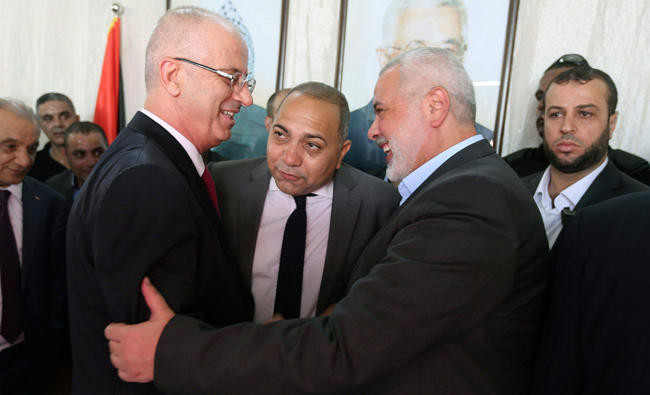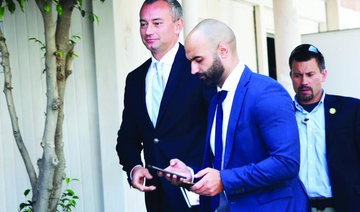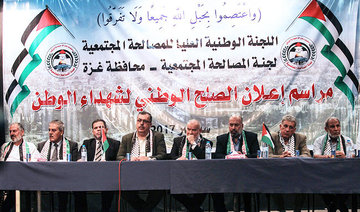GAZA CITY/AMMAN: Palestinians took a giant step toward national reconciliation on Monday when Prime Minister Rami Hamdallah and other officials from the Fatah-led Palestinian Authority in Ramallah arrived in the Hamas-run Gaza Strip.
Thousands of Gazans received the delegation warmly, hoping this would finally lead to an end to the 11-year division between Hamas and the Palestinian Authority. Hamdallah described the visit as a “historic moment” toward unity of the Palestinian people.
“We came on the orders of Palestinian President Mahmoud Abbas to announce to the world, from the heart of Gaza, that the Palestinian state cannot be without political and geographic unity between the West Bank and Gaza,” Hamadallah said.
“We know that the only way to achieve our goals is through unity, and to protect the Palestinian political system.”
He said the national unity government would now start to assume its administrative responsibility for the Strip.
The visit is Hamdallah’s first to Gaza in two years. He told journalists he was emotionally moved by the situation in Gaza because of the decade-long siege and the internal split.
An Egyptian security delegation led by the Egyptian ambassador to Israel, Hazem Khairat, will be monitoring the reconciliation process. Egypt, represented by President Abdel Fattah El-Sisi, was the sponsor of reconciliation talks in Cairo over the past few weeks.
After a Hamas delegation met Egyptian diplomats, the movement decided to dissolve its administrative committee and expressed its willingness to reconcile with its rival, the Fatah political party.
The UN Special Coordinator for the Middle East Peace Process, the Bulgarian politician Nickolay Mladenov, said that the Cairo agreements represented the last chance for Palestinian reconciliation.
“This opportunity must be well used,” he said during a visit to the Gaza Strip on Monday.
Fahmi Shurab, a professor of international relations at Al-Aqsa University in Gaza, told Arab News: “The reconciliation train has left the station and there is no stopping it because there is a consensus of opinion that both sides need each other and neither can negate the other.”
Everyone in Gaza was awaiting the reversal of a number of decisions made recently by the Ramallah leadership that led to a reduction in daily supplies of electricity, Shurab. “What is needed is for the Palestinian Authority to work on increasing the number of hours of electricity, to unite employees, and to resolve the border disputes.”
The electricity issue is a top priority for Nehad Mughni, the head of engineering and planning at the Gaza Municipality. “Electricity is crucial to help us pump water and treat sewage,” he told Arab News. A meeting late on Monday discussed the crucial issues of electricity, border crossings and the merger of public-service employees.
Many reconstruction projects in Gaza had been delayed because of Israel’s refusal to admit some technical items, Mughni said. “We are hoping that with reconciliation moving ahead, Israel will ease some of the restrictions it has placed on the entry of necessary reconstruction materials.” Mughni said that four wells that would alleviate water shortages in Gaza had not been completed because Israel has held up necessary technical and mechanical instruments, even though the German government was funding the projects.
Jad Isaac, the director of the Applied Research Institute Jerusalem, told Arab News that the Fatah-Hamas split had ended because both sides realized they had failed. “Both Fatah and Hamas have reached the conclusion that reconciliation is beneficial to both,” he said.
“The new leadership in Hamas is pragmatic, and realizes that they have to do something after they failed to meet the needs of Gazans. On the other hand, Fatah realized they have to do something before Dahlan strikes a deal with Hamas.” Mohammed Dahlan is the former Fatah leader in Gaza, whose return from the West Bank has long been rumored.
Mustafa Barghouti, head of the Palestinian Initiative Movement, said the ballot box was the key to the success of the reconciliation. “A mandate by the people through elections will be the best way to resolve any problem,” he told the BBC Arabic service.
Hamas has been the de-facto ruler of the Gaza Strip since 2007, after the party defeated President Mahmoud Abbas’s long-dominant Fatah party in parliamentary elections. Street battles between the two factions left many dead, and ended with Hamas ousting Abbas’s forces and taking over Gaza.
Hamas’s control over security and its nature as an armed resistance movement have also been an obstacle for the PA, which cooperates with Israel on security-related matters, as laid out in the Oslo Accords, signed in 1993 and 1995 between the Palestine Liberation Organization and Israel.
However, this is not the first time the two parties have attempted reconciliation; two previous agreements collapsed amid conflicts between the two parties.
However, many people are more optimistic this time because of the concrete steps the two parties are taking to finally achieve it.
Palestinian PM in Gaza for major reconciliation effort
Palestinian PM in Gaza for major reconciliation effort

Lebanon says 2 hurt as Israeli troops fire on people returning south after truce with Hezbollah

It said Israel fired artillery in three other locations near the border
BEIRUT: At least two people were wounded by Israeli fire in southern Lebanon on Thursday, according to state media. The Israeli military said it had fired at people trying to return to certain areas on the second day of a ceasefire with the Hezbollah militant group.
The agreement, brokered by the United States and France, includes an initial two-month ceasefire in which Hezbollah militants are to withdraw north of the Litani River and Israeli forces are to return to their side of the border. The buffer zone would be patrolled by Lebanese troops and UN peacekeepers.
Lebanon’s state-run National News Agency said two people were wounded by Israeli fire in Markaba, close to the border, without providing further details. It said Israel fired artillery in three other locations near the border. There were no immediate reports of casualties.
An Associated Press reporter in northern Israel near the border heard Israeli drones buzzing overhead and the sound of artillery strikes from the Lebanese side.
The Israeli military said in a statement that “several suspects were identified arriving with vehicles to a number of areas in southern Lebanon, breaching the conditions of the ceasefire.” It said troops “opened fire toward them” and would “actively enforce violations of the ceasefire agreement.”
Israeli officials have said forces will be withdrawn gradually as it ensures that the agreement is being enforced. Israel has warned people not to return to areas where troops are deployed, and says it reserves the right to strike Hezbollah if it violates the terms of the truce.
A Lebanese military official said Lebanese troops would gradually deploy in the south as Israeli troops withdraw. The official spoke on condition of anonymity because they were not authorized to brief media.
The ceasefire agreement announced late Tuesday ended 14 months of conflict between Israel and Hezbollah that began a day after Hamas’ Oct. 7, 2023 attack out of Gaza, when the Lebanese militant group began firing rockets, drones and missiles in solidarity.
Israel retaliated with airstrikes, and the conflict steadily intensified for nearly a year before boiling over into all-out war in mid-September. The war in Gaza is still raging with no end in sight.
More than 3,760 people were killed by Israeli fire in Lebanon during the conflict, many of them civilians, according to Lebanese health officials. The fighting killed more than 70 people in Israel — over half of them civilians — as well as dozens of Israeli soldiers fighting in southern Lebanon.
Some 1.2 million people were displaced in Lebanon, and thousands began streaming back to their homes on Wednesday despite warnings from the Lebanese military and the Israeli army to stay out of certain areas. Some 50,000 people were displaced on the Israeli side, but few have returned and the communities near the northern border are still largely deserted.
In Menara, an Israeli community on the border with views into Lebanon, around three quarters of homes are damaged, some with collapsed roofs and burnt-out interiors. A few residents could be seen gathering their belongings on Thursday before leaving again.
Algeria facing growing calls to release French-Algerian author Boualem Sansal

- “The detention without serious grounds of a writer of French nationality is unacceptable,” France’s Foreign Minister Jean-Noël Barrot said
- The European Parliament discussed Algeria’s repression of freedom of speech on Wednesday and called for “his immediate and unconditional release”
PARIS: Politicians, writers and activists have called for the release of French-Algerian writer Boualem Sansal, whose arrest in Algeria is seen as the latest instance of the stifling of creative expression in the military-dominated North African country.
The 75-year-old author, who is an outspoken critic of Islamism and the Algerian regime, has not been heard from by friends, family or his French publisher since leaving Paris for Algiers earlier this month. He has not been seen near his home in his small town, Boumerdes, his neighbors told The Associated Press.
“The detention without serious grounds of a writer of French nationality is unacceptable,” France’s Foreign Minister Jean-Noël Barrot said on Wednesday.
He added Sansal’s work “does honor to both his countries and to the values we cherish.”
The European Parliament discussed Algeria’s repression of freedom of speech on Wednesday and called for “his immediate and unconditional release.”
Algerian authorities have not publicly announced charges against Sansal, but the APS state news service said he was arrested at the airport.
Though no longer censored, Sansal’s novels have in the past faced bans in Algeria. A professed admirer of French culture, his writings on Islam’s role in society, authoritarianism, freedom of expression and the civil war that ravaged Algeria throughout the 1990s have won him fans across the ideological spectrum in France, from far-right leader Marine Le Pen to President Emmanuel Macron, who attended his French naturalization ceremony in 2023.
But his work has provoked ire in Algeria, from both authorities and Islamists, who have issued death threats against him in the 1990s and afterward.
Though few garner such international attention, Sansal is among a long list of political prisoners incarcerated in Algeria, where the hopes of a protest movement that led to the ouster of the country’s then-82 year old president have been crushed under President Abdelmadjid Tebboune.
Human rights groups have decried the ongoing repression facing journalists, activists and writers. Amnesty International in September called it a “brutal crackdown on human rights including the rights to freedom of expression, peaceful assembly and association.”
Algerian authorities have in recent months disrupted a book fair in Bejaia and excluded prominent authors from the country’s largest book fair in Algeria has in recent months, including this year’s Goncourt Prize winner Kamel Daoud,
“This tragic news reflects an alarming reality in Algeria, where freedom of expression is no more than a memory in the face of repression, imprisonment and the surveillance of the entire society,” French-Algerian author Kamel Daoud wrote in an editorial signed by more than a dozen authors in Le Point this week.
Sansal has been a polarizing figure in Algeria for holding some pro-Israel views and for likening political Islam to Nazism and totalitarianism in his novels, including “The Oath of the Barbarians” and “2084: The End of the World.”
Despite the controversial subject matter, Sansal had never faced detention. His arrest comes as relations between France and Algeria face newfound strains. France in July backed Morocco’s sovereignty over the disputed Western Sahara, angering Algeria, which has long backed the independence Polisario Front and pushed for a referendum to determine the future of the coastal northwest African territory.
“A regime that thinks it has to stop its writers, whatever they think, is certainly a weak regime,” French-Algerian academic Ali Bensaad wrote in a statement posted on Facebook.
Iranian Revolutionary Guards officer killed in Syria, SNN reports

DUBAI: Iranian Revolutionary Guards Brig. Gen. Kioumars Pourhashemi was killed in the Syrian province of Aleppo by “terrorists” linked to Israel, Iran’s SNN news agency reported on Thursday without giving further details.
Rebels led by Islamist militant group Hayat Tahrir Al-Sham on Wednesday launched an incursion into a dozen towns and villages in northwest Aleppo province controlled by Syrian President Bashar Assad.
Israel-Hezbollah ceasefire unlikely to hold: UK ex-spy chief

- Richard Dearlove: Agreement suits both parties in ‘short to medium term’
- Deal leaves Iran ‘exposed’ as its Lebanese ally is temporarily incapacitated
LONDON: The ceasefire deal struck this week between Israel and Hezbollah is unlikely to hold, a former head of MI6 has warned.
Richard Dearlove, who headed the British intelligence service from 1999 to 2004, told Sky News that the deal, which came into effect on Wednesday, is a “retreaded agreement from 2006.”
That initial deal was designed to keep Hezbollah away from the border region with Israel, overseen by the Lebanese military and the UN, but in effect it “did absolutely nothing,” he said.
This week’s deal suits both Israel and Hezbollah “in the short to medium term,” Dearlove said, adding: “The Israelis must know how much of the infrastructure of Hezbollah they’ve taken down … They haven’t taken it down completely, but maybe the Lebanese state can reassert some of its authority as the government of Lebanon and keep Hezbollah to an extent under control. We just have to wait and see what happens.”
He said the ceasefire deal will be a blow to Hezbollah’s backer Iran, leaving the latter “exposed” with one of its allies temporarily incapacitated.
But he warned that this could escalate into “direct” confrontation between Israel and Iran were the latter to launch another ballistic missile attack.
Israeli FM: ‘No justification’ for ICC to take steps against Israeli leaders

- The foreign minister also said Israel would finish the war in Gaza when it “achieves its objectives”
PRAGUE: Israeli foreign minister Gideon Saar said on Thursday that the ICC had “no justification” for issuing arrests warrants for Israeli leaders, in a joint press conference with Czech Foreign Minister Jan Lipavsky.
Saar told Reuters Israel has appealed the decision and that it sets a dangerous precedent.
The foreign minister also said Israel would finish the war in Gaza when it “achieves its objectives” of returning hostages being held by Hamas in Gaza and ensuring the Iranian-backed group no longer controls the strip. Saar said Israel does not intend to control civilian life in Gaza and that he believes peace is “inevitable” but can’t be based on “illusions.”
















